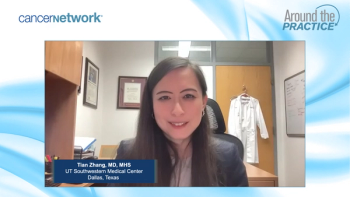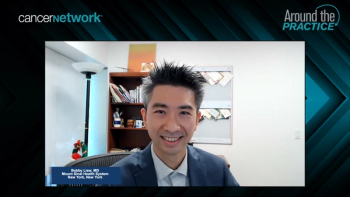
Key opinion leaders in the field of prostate cancer close out their discussion by sharing excitement for future evolutions in the setting of hormone-sensitive disease management.

Your AI-Trained Oncology Knowledge Connection!


Key opinion leaders in the field of prostate cancer close out their discussion by sharing excitement for future evolutions in the setting of hormone-sensitive disease management.

Expert panelists consider the possibility of taking a break from treatment given a patient’s response to therapy along with other unique management strategies in the setting of metastatic hormone-sensitive prostate cancer.

In a third clinical scenario of metastatic hormone-sensitive prostate cancer, panelists discuss oligometastatic disease, radiation therapy, and the potential role for PSMA-PET scans.

Centering focus on a second clinical scenario of metastatic hormone-sensitive prostate cancer, key opinion leaders identify treatment options based on variations in presentation.

Shared insight on strategies to monitor patient response to therapy and select second-line treatment when hormone-sensitive prostate cancer progresses.

After nuancing quality of life data with chemotherapy in metastatic hormone-sensitive prostate cancer, panelists consider the value of multidisciplinary care.

Focused discussion on the respective roles of doublet and triplet regimens in patients newly diagnosed with metastatic hormone-sensitive prostate cancer.

Panelists reflect on molecular markers and other clinical factors that aid in the selection of best therapy for a patient with metastatic hormone-sensitive prostate cancer.

Key opinion leaders in the field of prostate cancer management consider optimal molecular testing practices in a patient with metastatic hormone-sensitive disease.

PSMA-targeting PET ligand 18F-rhPSMA-7.3 yielded high detection rates for patients with recurrent prostate cancer regardless of factors such as PSA levels, PSA doubling time, or Gleason scores, according to Benjamin H. Lowenritt, MD, FACS.

Future focuses following the phase 3 SPOTLIGHT trial will include identifying sites of recurrence and different intensity levels for 18F-rhPSMA-7.3 in suspected recurrent prostate cancer, according to Benjamin H. Lowenritt, MD, FACS.

The goal of the analysis of the phase 3 SPOTLIGHT trial was to evaluate how clinical factors impact 18F-rhPSMA-7.3 detection rates in a population of patients with suspected recurrent prostate cancer, according to Benjamin H. Lowenritt, MD, FACS.

Novel PSMA-targeting PET ligand 18F-rhPSMA-7.3 adds to the recurrent prostate cancer armamentarium, according to Benjamin H. Lowentritt, MD, FACS.

Before closing out their discussion on novel treatment approaches to metastatic CSPC, expert panelists share hope for further evolution in care.

Expert perspectives on the utilization of genomic profiling in patients with metastatic castration-sensitive prostate cancer to impact treatment decisions.

A brief discussion on the use of doublet versus triplet therapy in patients with low-volume metastatic prostate cancer.

Expert panelists consider which factors would push them toward utilizing triplet therapy in patients with metastatic castration-sensitive prostate cancer.

Centering discussion on a patient case of high-volume metastatic CSPC, expert panelists review the option of triplet therapy based on the PEACE-1 trial.

Shared insight on optimal patient monitoring strategies while administering therapy for metastatic castration-sensitive prostate cancer.

Shared insight on optimal patient monitoring strategies while administering therapy for metastatic castration-sensitive prostate cancer.

Panelists provide comprehensive insight on treatment strategies specific to the setting of low-volume metastatic prostate cancer.

Expert oncologists review the selection of apalutamide + androgen deprivation therapy in this patient scenario of metastatic castration-sensitive prostate cancer.

A brief discussion on the toxicities and drug-drug interactions associated with frontline therapies in metastatic CSPC and when it would be appropriate to alter treatment to mitigate toxicity.

Focused discussion on drug and patient factors that aid in the selection of frontline therapy for metastatic castration-sensitive prostate cancer.

Shared insight on the frontline use of chemotherapy options for patients with metastatic CSPC in the context of AR-targeted therapies.

After reviewing a patient scenario of metastatic castration-sensitive prostate cancer, expert panelists break down frontline treatment options in this setting.

Published: August 11th 2022 | Updated:

Published: August 24th 2022 | Updated:

Published: April 28th 2023 | Updated:

Published: September 14th 2022 | Updated:

Published: May 5th 2023 | Updated:

Published: September 8th 2022 | Updated: